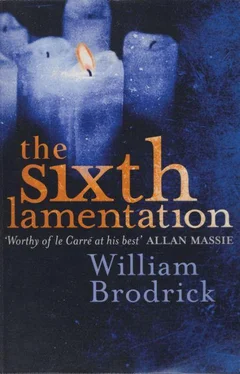William Brodrick - The Sixth Lamentation
Здесь есть возможность читать онлайн «William Brodrick - The Sixth Lamentation» весь текст электронной книги совершенно бесплатно (целиком полную версию без сокращений). В некоторых случаях можно слушать аудио, скачать через торрент в формате fb2 и присутствует краткое содержание. Жанр: Триллер, на английском языке. Описание произведения, (предисловие) а так же отзывы посетителей доступны на портале библиотеки ЛибКат.
- Название:The Sixth Lamentation
- Автор:
- Жанр:
- Год:неизвестен
- ISBN:нет данных
- Рейтинг книги:5 / 5. Голосов: 1
-
Избранное:Добавить в избранное
- Отзывы:
-
Ваша оценка:
- 100
- 1
- 2
- 3
- 4
- 5
The Sixth Lamentation: краткое содержание, описание и аннотация
Предлагаем к чтению аннотацию, описание, краткое содержание или предисловие (зависит от того, что написал сам автор книги «The Sixth Lamentation»). Если вы не нашли необходимую информацию о книге — напишите в комментариях, мы постараемся отыскать её.
The Sixth Lamentation — читать онлайн бесплатно полную книгу (весь текст) целиком
Ниже представлен текст книги, разбитый по страницам. Система сохранения места последней прочитанной страницы, позволяет с удобством читать онлайн бесплатно книгу «The Sixth Lamentation», без необходимости каждый раз заново искать на чём Вы остановились. Поставьте закладку, и сможете в любой момент перейти на страницу, на которой закончили чтение.
Интервал:
Закладка:
3
Anselm rose at 5 a.m., having been unable to ‘sleep. He tried to say Lauds but a strong, invasive melancholy scattered his powers of concentration. And yet his mind was deeply attuned to the important task of the day He would neither eat nor drink nor rest until it was over.
Conroy emerged cheerily for breakfast, eating everything that was brought forth from the kitchen. His irrepressible gathering in of all life’s moments — even eating — raised Anselm’s spirits. The Prior had been right all along. It was a good idea to show Conroy the North Country… for Anselm’s sake. He decided to bring his companion with him for the confrontation, as long as the great oaf didn’t tell any jokes.
Shortly after ten, Anselm pushed open the gate to ‘Pilgrim’s Rest’. Conroy followed him to the stone porch. The door was ajar. Voices drifted warmly from an unseen room. Anselm immediately imagined a coffee pot, loaves of bread, jars and pots upon a table, mingled morning greetings, children opening the fridge. He knocked. A moment later the door swung back in the hands of a little girl with large, enquiring eyes. And then Robert Brownlow appeared.
‘Ah,’ he said lamely, the colour draining from his face. ‘You’ve made it for my wife’s birthday’
Inside, they were introduced to Maggie, Robert’s wife; and then two of their five children, Francis and Jenny (with their respective spouses); and then the three grandchildren. But not Victor. He was not in the room. Anselm and Conroy were described as friends of Robert, who, throughout the entire charade, masked his anxiety with near complete success. Only Maggie, with her tight folded arms, betrayed a suspicion of insight. Then Robert led his guests to an upstairs room and knocked on the door.
Is this what a major war criminal looks like? thought Anselm. He wore various shades of respectable green, with a tartan tie, the unmistakable appearance of good but ill-fitting finds from tatty high street charity shops. His shoes were well worn but neatly polished. Robert stood behind the armchair that swallowed up the runaway
Now that he’d found him, Anselm had no idea what to say Whatever enquiry Cardinal Vincenzi expected Anselm to undertake, and whatever insinuated pressure Renaldi hoped he would exert, was not going to happen. The meeting had its own agenda. Anselm introduced himself and said:
‘Schwermann couldn’t hide for ever and neither can you. The police already know that you’re here. Even if you say nothing to them, and Schwermann’s convicted, he’ll begin an appeal. His legal representatives were looking for you and they’ll not let you go once they know that you’ve been found. So if you’re going to hide, it’s for the rest of your life. Is that what you want?’
The gentle clunking of a trowel upon the rim of a plant pot rang from the garden. Anselm glanced out of the window Maggie was helping one of the children plant a flower.
‘Victor,’ said Anselm, ‘I don’t know what happened in 1942 or 1944. Nobody does, except Eduard Schwermann and you.’
He was standing upon a worn rug, uncomfortably aware his calling in life transformed any public reflection into a sort of sermon. He stepped off the thread pedestal, saying, ‘There’s a jury empanelled in London to make a decision. They sit there, day in day out, hearing evidence, mostly from people who weren’t there. It’s a journey into memory with stumbling guides doing their best. But you, Victor, are different. You know the answers. Schwermann believes that if you enter the witness box, he’ll be acquitted. There are others who believe the opposite; that you, and only you, can prove he is guilty. Only one side can be right. I’m afraid I’m going to sound like a priest now, but the truth will out. Hasn’t the time come to give the past a proper burial?’
Victor Brionne’s face became mobile but his lips did not part. Deep down, thought Anselm, he’s holding tightly on to something. Anselm wrote down DI Armstrong’s name and number and placed it upon a sideboard. As he reached the door he turned instinctively and said:
‘You knew Jacques Fougeres?’
‘Yes.’ It was the only word he had spoken. His voice, in that one brief sound, disclosed a grave, enduring ache.
‘You know he had a blood relative, Pascal Fougeres?’
He nodded.
‘A young man who did everything possible to bring Schwermann to trial. Do you know he wanted. to find you?’
There was no response. Robert looked down upon Victor.
‘Do you know why?’ Anselm pleaded. ‘Not to expose you, or blame you. But because he had faith in the love of old friends. He believed that you would tell the truth.’
Victor closed his eyes, averting his head from Anselm’s unrelenting words.
‘He died on the very night he met some friends to discuss your importance. Not for himself, not for his own family, but for all those whose memories are being scattered to the wind.’ Anselm opened the door, his voice suddenly raised, indignant and accusing: ‘Did Pascal die for nothing… absolutely nothing at all?’
The house was empty when they got downstairs. Walking down the path they could see the family way ahead, ambling towards Lindisfarne Castle. Robert joined Anselm and Conroy at the gate. He said, trembling, ‘Father, I meant what I said when we first met. Victor Brionne died in 1945 as far as I’m concerned. Is it right to dismantle their world?’ He nodded over the wall, anxiously, at three generations becoming specks in the distance.
‘Is it right to leave other lives in pieces?’ replied Anselm. ‘I don’t pretend to have the answer, Robert. I doubt whether your father knows. But he’s the one who has to choose.’
Chapter Thirty-Five
1
Lucy took ‘Sibyl’s Cave’ home with her and placed it over the mantelpiece. For the rest of the weekend she kept re-entering the room to look at it. In that hint of a face drawn by the sweeping paint she saw Agnes, young and old, transcendent, aloft her disappointment.
When Lucy met Max and Mr Lachaise at court on Monday morning they all shook hands. Something like ease was growing between them. This was all the more remarkable because she (and presumably Max) had no idea as to who Mr Lachaise, their convener, might be. There was a disarming quality to his simplicity, like dealing with a child. Only he was nothing of the kind. He seemed older than anyone Lucy had ever known. And she recognised in his every move a type of empathy, something indefinable, that he held in common with her grandmother. She would have liked them to have met.
As was now common practice, the three of them sat in a row listening intently to the evidence presented before the court. For the next couple of days Mr Penshaw called a hotchpotch of witnesses to describe the nuts and bolts of organised murder. Mr Bartlett asked few questions, confining himself to small errors of detail.
‘In fact, the first deportation from Le Bourget-Drancy comprised standard third-class railway carriages, did it not?’
‘Yes, I’m sorry, you’re quite right. If it matters. ‘
‘Precision always matters,’ said Mr Bartlett kindly
Bartlett very occasionally gave a brief smile to the jury. After all, they’d been seeing each other every day, listening to the same witnesses. Lucy felt an atmosphere was developing between them. They were in this together, doing their level best. One or two had begun to smile back at him. Was it courtesy or empathy?
Lucy struggled to name a growing sensation. By some alchemy, Schwermann was almost detached from the proceedings. The link between the young SS officer and the elderly Defendant before them was peculiarly slender, the actions and attributes of fifty years ago having to be fixed on an older, much changed and hence different man. The passage of time itself had blurred not only the edges of responsibility but the consequences of the crime. Several newspapers had begun to question the propriety of the trial ‘so long after the events in question’, those being the fleshiness of killing, the smell of filth and the sound of fear. The younger man who’d been there was slipping out of reach; the older chap seemed crucially disconnected from his own past.
Читать дальшеИнтервал:
Закладка:
Похожие книги на «The Sixth Lamentation»
Представляем Вашему вниманию похожие книги на «The Sixth Lamentation» списком для выбора. Мы отобрали схожую по названию и смыслу литературу в надежде предоставить читателям больше вариантов отыскать новые, интересные, ещё непрочитанные произведения.
Обсуждение, отзывы о книге «The Sixth Lamentation» и просто собственные мнения читателей. Оставьте ваши комментарии, напишите, что Вы думаете о произведении, его смысле или главных героях. Укажите что конкретно понравилось, а что нет, и почему Вы так считаете.












